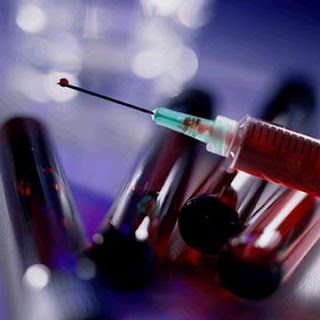RAREST BUT THE DEADLY ONES.....
The aim of this blog is to spread awareness about a particular disease -aplastic anemia which is an uncommon disorder about which most of the people are not at all aware.Although it is rare but unfortunately can be turned out into a life threatening disease.Now you must be thinking what exactly aplastic anemia is??? and why we need to focus on this particular topic??? So to find these answers go on with the articles and share to spread awareness.....
Monday, 18 February 2013
ESTIMATION OF FUTURE SURVIVAL RATES
(Prognosis
of Aplastic anemia)
If the patients are left untreated then it may lead to death typically within six months or may be earlier in severe cases. But if the disease is diagnosed and treatment is started well in time then the survival rate is improved up to some extent.
Survival rates depends on
several factors-
·
age of the patient
·
how well the bone marrow of
the donor (mostly sibling) matches with that of the patient.
Sunday, 17 February 2013
LIFE STYLE,HOME REMEDIES AND PRECAUTIONS
·
Even if the patient has Aplastic anemia at mild stage then
also he/she needs to take care of himself/herself by taking proper rest and break
after short periods of working hours.
·
The patient has to avoid sports involving any sort of possibilities of injury since he/she has risk
of excessive bleeding which will be difficult to stop due to low platelets
count.
·
The patient has to develop proper hygiene habits to
stay away from germs and other infections.
TEST AND DIAGNOSIS
The diagnosis can be done through bone marrow examination which is known as bone marrow biopsy and a number of blood tests.
To diagnose aplastic anemia :
To diagnose aplastic anemia :
- Blood tests. - Aplastic anemia can be suspected when all three blood cell levels are very low.
- Bone marrow biopsy. This procedure is used for confirmation .In this ,a small sample of bone marrow is removed from a large bone in your body, such as your hipbone with the help of a needle. After that this bone marrow sample is examined for the diagnosis purpose.
HOW IS APLASTIC ANEMIA TREATED ?????
People who have mild or moderate aplastic anemia
may not need treatment as long as the condition doesn't get worse. Now the treatments
available for aplastic anemia may include blood transfusions and medications for serious
cases, and, in severe cases, bone marrow transplantation is must. Severe aplastic
anemia, in which your blood cell counts are extremely low, is life-threatening
and the patient has to be hospitalized so that the treatment can be started immediately.
Lets have a look at the treatment techniques :
Lets have a look at the treatment techniques :
·
Blood
transfusions- This isn’t a cure but an alternative to raise the
blood cells (red blood cells and platelets) which the bone marrow has failed to
produce.There is no limitation on the no of transfusion that will be required.Some
complications might arise due to continuous use of this technique.
·
Stem
cell transplant- Also called bone marrow transplant which is
possible only if the patient has a matching donor(mostly siblings).This method
is avoided until there is no other option left i.e. in very severe cases only.In
this method ,firstly the bone marrow of the patient is depleted using
radiations then new bone marrow is injected into the bloodstream.This method
has life-threatening complications since the body may reject the new blood
cells.
·
Immunosuppressants-
involve drugs that suppress the activity of immune system called
immunosuppressants for e.g. cyclosporine and anti-thymocyte globulin . By the
use of these drugs immune cells that are damaging the bone marrow are suppressed. Thus the bone
marrow may recover to generate new blood cells. This method is used in patients
for whom transplantation cant be done.
·
Bone
marrow stimulants- Drugs are used which stimulate the bone
marrow to produce new blood cells.
·
Antibiotics,
antivirals –Medicines are used to prevent infections.
Research is still going on to find more appropriate
treatment techniques which less complications than the existing ones.
WHAT CAUSES APLASTIC ANEMIA ?????
Now there are certain possibilities such as -the
patient has this disorder by birth or it is possible that he/she acquires or
develop it through factors mentioned below or it is also possible that he/she
inherits this gene from the parents.
Acquired aplastic anemia is more common, but the Inherited one is rare.
Acquired aplastic anemia is more common, but the Inherited one is rare.
Factors:
- Can be a side effect of exposure to radiations. (For instance Marie Curie, famous for her great work in the field of radioactivity, died of aplastic anemia after working unprotected with radioactive materials)
- Radiations used in chemotherapy treatments of cancer.
- Exposure to toxic chemicals, such as some used in pesticides and insecticides,benzene etc.
- Due to intake of certain drugs used to cure some other illness .
- Due to adverse reaction of antibiotics taken.
- An autoimmune disorder, in which your immune system instead of providing immunity starts attacking healthy cells, including the stem cells in your bone marrow.
- Due to viruses involved in hepatitis, HIV etc.
- Chances of autoimmune disorder may arise during pregnancy.
- Unknown causes still prevail in which the doctors are unable to identify the cause of the problem.
Subscribe to:
Comments (Atom)














